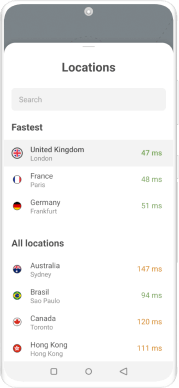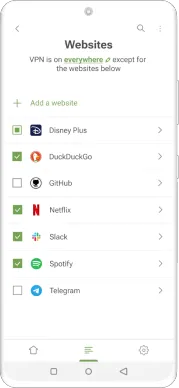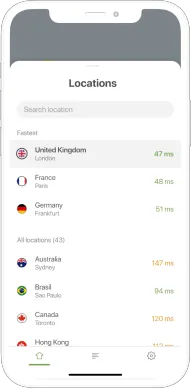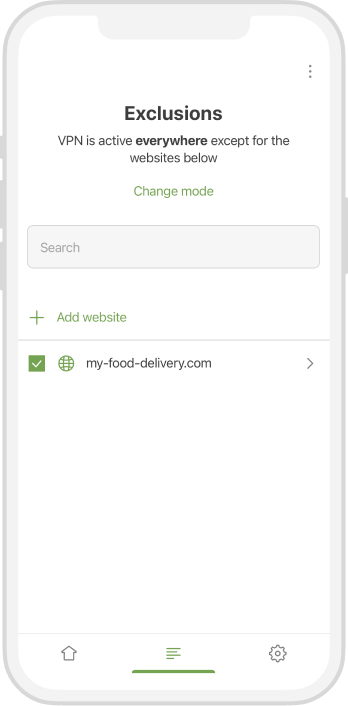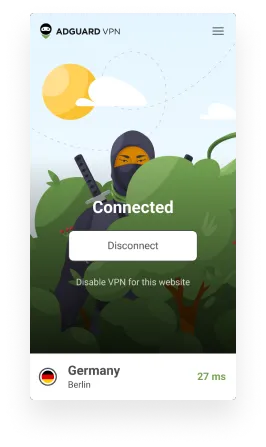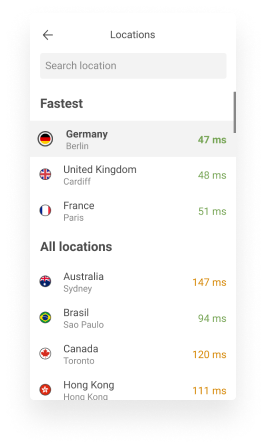How does VPN protect your privacy?
We’ve already told you what VPN is, how it works and even how to unblock websites using it. Here we’ll be talking about using VPN for privacy on the Internet. How does VPN protect you? Let’s see.
Table of contents
What privacy is and why it matters
How can you protect confidentiality?
How VPN enables privacy
Why AdGuard
What privacy is and why it matters
When we are speculating on whether private internet actually exists, the first thing that comes to mind to prove it does is VPN. Indeed, this pragmatic response is the most common. If you google ‘privacy + VPN’, it might seem that these words are almost synonyms. But before jumping/proceeding to the part where we’ll discuss how VPN protects you, let’s first address the issue of privacy.
According to Princeton University's WebTAP project, Google trackers are lurking on 75% of websites. Not only they track what you are searching for, but also on which websites. Google then uses this personal information and guess what? You see targeted ads. Everywhere. But what’s really scary is that your data may come not only to advertisers’ greedy hands, but also to lawyers. They can subpoena personal data even in case of divorce. As you can see from Google Transparency Report, the number of user data disclosure requests and users/accounts grows every year.
This statistics looks intimidating, but for each person in his/her own way. A person may have nothing to hide — he/she just chats, watches videos of different nature, sometimes the ones you wouldn’t like their ISP to know about. Or, occasionally downloads movies from BitTorrent that are copyrighted.
Or, for instance, a person might have serious health issues and search information about it – you wouldn’t like your health insurance provider to know about it, would you?
Of course, the worst-case scenario is the last one but in all situations above someone can track your activity whether it be stealing browsing history, collecting personal data or wiretapping conversations. Someone can literally watch your every move and use this information against you.
How can you protect your confidentiality?
If the stats and examples from the previous paragraph made you seriously reappraise your online life, it might be the best time to safeguard your online privacy. Here are several ways that would build defences strong enough to keep out trackers and their concomitants.
Choose your ISP carefully
Just think about it: every time you search for something in your browser, it sends a query to a DNS server. Before the query reaches it, it has to go through the checkpoint — your ISP. And your ISP won’t hesitate to read these queries.
Of course, not all ISPs track your browser queries but there are far more unfair players. Another frightening figure: the majority of ISPs keep records of your web searches for a period ranging from a few months to a year. So, choose your ISP as carefully as possible.
Reinforce the protection of your login credentials
Do you use the same password for many online accounts? You’d better not. People often underestimate the importance of having strong and unique passwords.
Your username and password are the keys to the storage of your information in various sources – imagine what could happen if it falls into the wrong hands.
How to strengthen your credentials?
First, a username. Make sure it’s not based on your name and doesn’t include your age, year or date of birth. Well, it can be connected to your identity somehow, but try not to make it obvious – this will simplify hackers’ task.
Then, a password. Basically, there are two options: a) learn how to make passwords strong and create them yourself; b) use a password manager app.
Here are combinations that are strictly prohibited: 0000, 1111, 123456, qwerty, password, kate0312, etc. They are in the top of the most common user passwords, and it’s no big deal to crack them. Instead, use a combination of upper and lower case letters, add numbers and even symbols, if practicable. Your password must be compound, not necessarily long. The more complicated it is, the longer it will take for a computer to find the right combination.
If you don’t want to be creative thinking of another password combination and memorize it (ugh!), use a reliable password manager from here.
Also, don’t oversight 2-factor authentication (2FA). You might have encountered it when logging into your account on a new device. The app usually requires to enter the access code sent to the device where you used this app before. So, 2FA double protects you from someone sneaky.
Use an anonymous browser and a private search engine
If you want to check your browser, take time to study its Terms of Use and Privacy Policy. Surprise-surprise, they might actually monitor your online activities, sell this information to advertisers who would create your profile.
Without going into further details, we recommend you to use an anonymous browser. The Tor browser is a good example.
Many companies producing web browsing software also have their own search engine, which monitors your online searches likewise. These searches then can be linked to computer, IP address – and to your personal identity.
Plus, search engines store information on your geolocation for up to a few days. Spoiler: people in the legal field enjoy the right to use this information.
The best solution here is to switch to a private search engine: DuckDuckGo, for example.
Install a VPN
We’ve already discussed what VPN is, but a quick recap wouldn’t hurt, right? VPN is short for Virtual Private Network, it is an invisibility cloak, if you like, that protects your browsing by hiding your real IP address and encrypting your data.
Let’s recall the previous examples of ISPs reading browser queries, advertisers creating user profiles and sending targeted ads and lawyers using personal information for trial. Can you tell what unites them? At all times user’s online data was unencrypted.
This is where a VPN comes to the rescue. It guides your online data through secure tunnels and delivers it intact at its final destination – a DNS server.
Beware of totally free or unknown VPNs: ironically, they could sell your data to ad companies or worse, put your privacy at risk. In the study from this article, 150 free VPNs were tested.
85% of them turned out to have permissions that could jeopardize a user’s privacy;
¼ exposed a user’s traffic to leaks;
18% even contained malware and viruses.
But while some VPNs are not secure, others can definitely be trusted. The bottom line is, you should opt for a paid service of a reputable company.
How VPN enables privacy
Using a trustworthy VPN, you can browse safely because your connection and traffic are encrypted. But from who exactly? Let’s look at some VPN features and illustrate them with a few examples.
Feature 1: VPN makes the connection more secure by encrypting the user's traffic on the way from his/her computer to a VPN server.
Example: A malicious person on your local network wants to intercept your traffic. Thanks to a VPN, this interception will prove useless, since the hacker won’t be able to see the contents of the traffic.
Feature 2: VPN allows you to access blocked content.
Example: A website is blocked for some reason. A VPN allows you to access it by sending your request using an alternative route: first, traffic passes through a VPN server, and only then it goes to the website.
And a real-life example: during blocking Telegram in Russia, Roskomnadzor blocked a lot of AWS (Amazon Web Services) servers. As a result, many websites not related to Telegram, but located on the same servers, were blocked too.
Feature 3 (the consequence of the previous one): VPN hides which Internet resource you are trying to access.
Example: If someone, for instance, your ISP, collects stats about you (which websites you visit), this will also be impossible, because your requests will look like requests to a VPN server, and not to the endpoint (site). Facebook, Tinder, and Snapchat are the leaders – this website and mobile apps collect a huge amount of data about you.
Feature 4: VPN hides your real whereabouts.
Example: Probably, you have software or popular streaming services in mind that have an excessively expensive monthly subscription. The companies that produce them usually have differing pricing policies: the same product may have different prices depending on the country where it’s sold. With a VPN, you can see local prices and special offers and get a cheaper subscription. For example, if you use a server located not in Russia or America, but, say, in India, subscription charge may be several times lower.
Feature 5: VPN makes your Wi-Fi connection secure.
Example: With a VPN, no one can intercept your data. If your connection is not encrypted or you use a public Wi-Fi network, someone could exploit that. Hackers are capable of anything: they can get access not only to your traffic and browser history, but also to private messages and credit card information. They are able to redirect the transfer of funds from your debit or credit card to their pockets. To prevent this from happening, use a VPN. This technology creates a secure tunnel between your device and a VPN server, encrypts all your traffic, and protects your passwords and personal information from hackers.
Why AdGuard
Progressive encryption
Some VPNs are too easy to detect. The main difference between AdGuard VPN and its competitors is our own protocol that disguises itself as the usual traffic, so it will be far more difficult for someone to catch and ban it.
Trusted developer
We believe us to be a reliable developer with more than 10 years of decent work under our belts and 25 million users of AdGuard products.
70+ locations worldwide
From the United States to Australia, from France and Germany to Singapore and Japan. We already have 70+ servers and don’t intend to rest on it. More locations accelerate response times and maximize value and convenience for our users.
Ultra-fast servers
Another common drawback of many other VPNs is that they are way too slow. Or, to be precise, they make Internet speed lower. Not the case for AdGuard – thanks to our own protocol, we can maintain high speed together with secure encryption.
No activity logs policy
We don’t keep activity logs, and this is kind of rule #1 for all AdGuard products. This means that neither your ISP, no any government will know what you’re doing on the websites.
24/7 support
We don’t just care, we care non-stop! Contentment of our users is essential for us.
Try AdGuard VPN — now available as a browser extension for Chrome and Firefox and as an app for Android.



